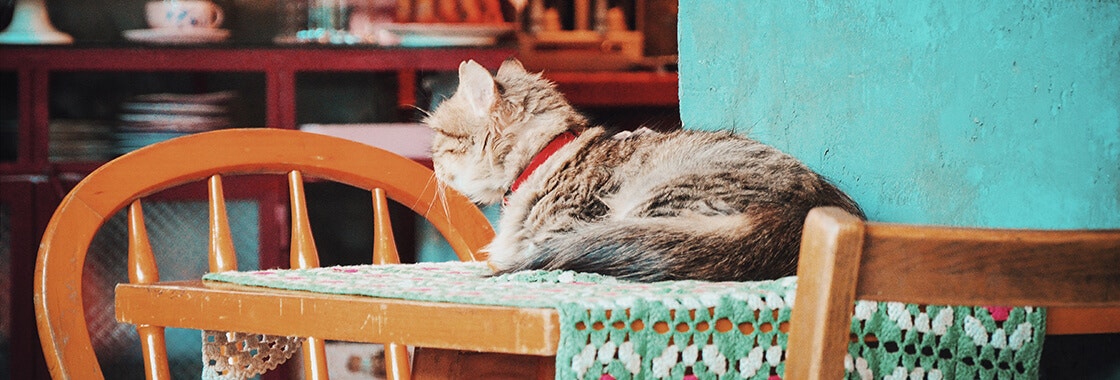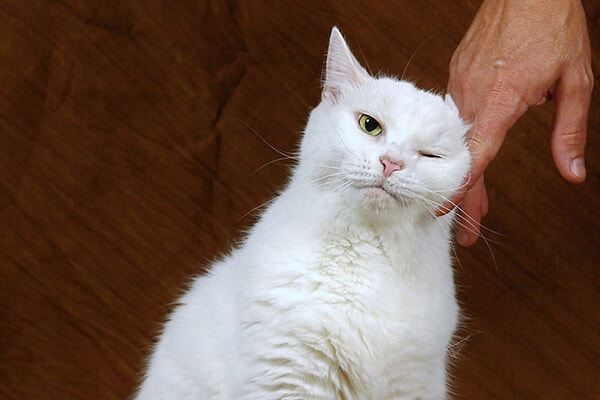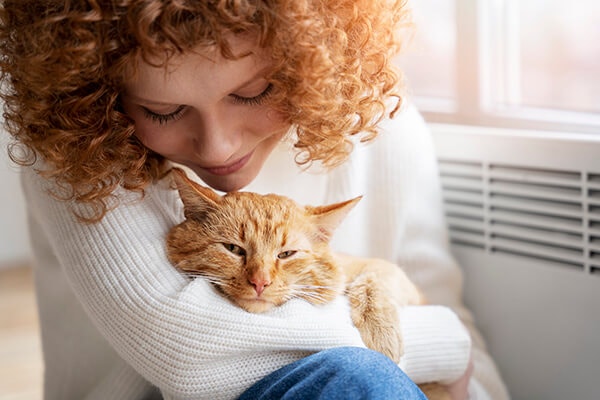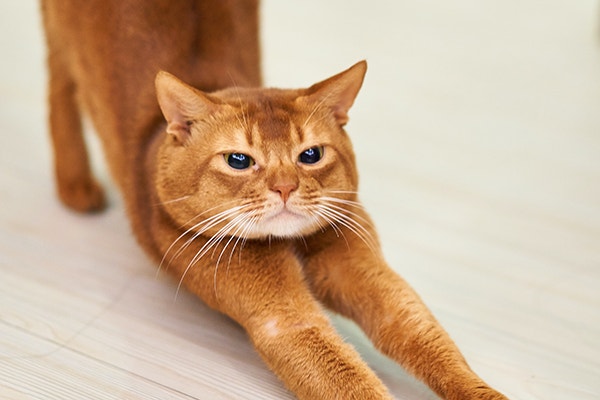Why is your cat not eating? The main causes & what can be done

Share
Has your feline friend gone off their food? While cats can be picky eaters sometimes, it’s important to take notice of their eating habits. A loss of appetite can be a sign of serious health problems, so if they’ve been off their food for 24 hours, it’s time to get your vet’s advice. This said, if they’ve been through a transition, such as moving house or a change in diet, it’s possible it’s a simple case of them needing time to adjust. Outdoor cats may also find food when they’re away from the home, such as through hunting or even from neighbours.
Read on to learn more about the various possible causes for your cat not eating much, as well as tips for regaining their interest in food if your cat has lost its appetite because of anxiety or a change in circumstance.
When should you worry about your cat not eating?
If your cat hasn’t eaten, or you notice a significant change in their eating habits for anything upwards of 24 hours, you should get them seen by a vet.
Regardless of the cause, not eating can cause further health problems, so the quicker you get them examined, the sooner something can be done to help and prevent further complications. One potential risk of not eating is a dangerous condition known as hepatic lipidosis - often referred to as fatty liver disease or fatty liver syndrome - which can be fatal if left untreated.
Why is my cat suddenly not eating?
The reason your cat’s not eating can be medical or environmental. Pain, congestion, sickness and anxiety can all put even the greediest of cats off their food.
Of course, there are also much simpler answers to the issue, especially if your cat’s not eating much but acting normal. One being that you’ve recently swapped your cat onto a different variety of food, for example moving from kitten to adult cat food. Another being that your furry friend is being fed elsewhere, such as by a well meaning neighbour.
Medical causes for cats not eating
There are a number of underlying illnesses that can cause a cat to lose its appetite. These can include dental issues, digestive discomfort, diabetes and respiratory infections. So it’s best to get your cat seen by a vet quickly to find the source of the problem.
If illness is the cause of the problem, your vet may suggest a change in food, or in more serious cases, prescribe medicines that act as appetite stimulants or recommend syringe-feeding your cat a liquid diet or fitting a feeding tube.
Below are a few possible medical reasons for your cat’s lost appetite.
Dental problems
If your cat’s not eating much, check their teeth and gums for signs of irritation. While many cats won’t let a sore mouth get between them and their dinner, things like a broken tooth, toothache and inflamed gums can make things uncomfortable. If you spot anything that concerns you, or simply can’t check your cat’s mouth without them trying to bite or scratch, arrange to see a vet.
Digestive troubles
Much like us, if a cat has an upset stomach or abdominal pain, they likely won’t feel like eating. Causes of this can range from acid reflux and food intolerances to parasites, irritable bowel disease and tumours. Cats also have a tendency to eat things they shouldn’t or swallow hairballs, which can cause blockages. Some will pass by themselves, but more serious cases will require surgery, so it’s important to see a vet in any case.
As well as a change in your cat's eating habits, things to look out for include vomiting, retching, diarrhoea and lethargy. To check for conditions such as feline pancreatitis and cancer, your vet may recommend performing tests, including bloodwork or an abdominal ultrasound.
Diabetes, hyperthyroidism or kidney disease
If your cat was ravenously hungry before suddenly losing its appetite, or you’ve noticed them drinking more than usual, it’s possible they could have a condition such as diabetes, hyperthyroidism (overactive thyroid) or kidney disease.
Diabetes and hyperthyroidism both cause extreme hunger in most cats at first, which can be paired with weight loss and followed by a sudden loss of appetite. An increase in drinking is also a common sign of these underlying health problems, especially if they are drinking more but not eating. In any of these cases, it’s important you seek veterinary treatment.
Respiratory infections
‘Cat flu’ and other viruses can be a reason for a cat not eating much, as the congestion can impact their sense of taste and smell, making their food less appealing. Symptoms like runny eyes, a runny nose, and snuffly breathing are often signs your cat is suffering with cat flu or something similar.
You may be able to encourage them to eat by warming up some wet food in the microwave to increase the aroma or giving them smelly food such as tuna or sardines. If they’re still not interested, get them seen by a vet, as cat flu can sometimes require treatment.
Vaccinations
If your cat has recently had their routine vaccinations, this could be why they don’t feel like eating. While vaccinations protect them from serious diseases, they can cause side effects in some cats, including a loss of appetite. This should pass after a few hours to a day.
Environmental causes for cats not eating
It’s very possible that the reason your cat’s not eating much is psychological or related to their environment. Big changes such as moving house with your cat or introducing a new family member can leave them feeling a bit out of sorts.
Here are a few possible factors that could explain your cat’s lost appetite and how you can help your furry friend.
New surroundings or circumstances
Introducing your cat to a new home and neighbourhood, or even to a new baby or pet, can be a lot for them to process. They’re likely to have to adapt to a new feeding spot, a new routine and potentially even new company. You can help them get settled by creating safe spaces for them and making sure their food is easily accessed in a peaceful spot - away from competing pets or crying babies. Be sure to give them lots of love and attention while they’re settling into the new circumstances to help them feel at home and at ease.
A change in diet
Cats are creatures of habit and can lose interest if their food is suddenly swapped for something new and unfamiliar. For example, if your cat’s not eating wet food, after having always eaten dry food, it’s going to take them a bit of time to adjust. Your cat can also be sensitive to certain shapes and textures. Likewise, cats can simply get bored of eating the same food day in day out, in which case you may need to explore new options.
The best way to change your cat’s diet is to slowly begin mixing it in with their old food. You should do this over the space of 7-10 days, increasing the amount of new food you include in the mix gradually over this period. Never starve your cat into eating a certain type of food. If they reject it, find something they do enjoy. If you’re not sure whether to give your cat wet or dry cat food, take a look at our article to learn more about the pros and cons of each.
The type of bowl
Believe it or not, sometimes the bowl itself can be cause for your cat not eating. So, if your cat’s not eating much but acting normal, test them with a new bowl. Most cats have a blind spot directly below their nose, which can block their view of the food hidden around the edges. You may even have noticed your cat nudging food around with their nose or paws, or knocking the bowl over. To make things easier for them, raising the bowl slightly and choosing one that’s round and shallow can help.
Stress
Disruption to their environment, such as building work around the home can make your cat feel anxious. The best way to make them feel at ease in these kinds of situations is to make them a safe space and provide them with everything they need (food, water, bed, scratching post, and litter tray) as far away from any sources of noise or stress as possible.
Food association
If your cat has spent time in an animal hospital or at a cattery, they may associate the food they ate with their experience of the stay. So, naturally, if they felt anxious or stressed at that time, they would then associate the food with this feeling. If this is the case, try switching your cat’s food for something else and see how they react. Sometimes encouraging them to start eating again with something tasty like tuna or scrambled eggs will do the trick.
If your feline friend has stopped eating, it’s really important to seek veterinary advice if it goes on for longer than 24 hours. While sometimes the cause is environmental and not medical, it’s important to rule out underlying illness. Your vet will also be able to recommend ways to get your cat back into their usual eating habits before it becomes a problem.
You can learn more about how to feed your cat in our articles on the topic, including how much wet food to feed your cat and more.



